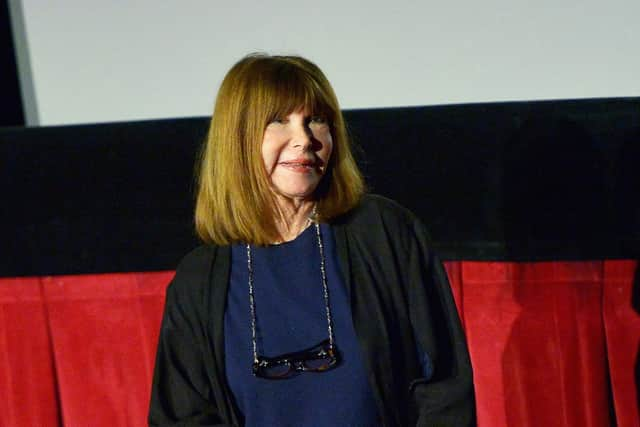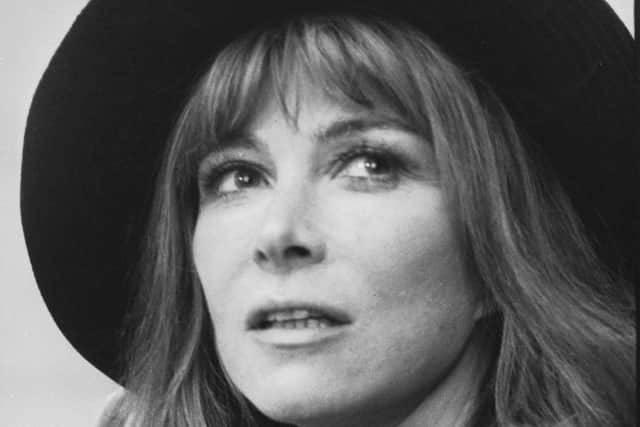Lee Grant: 'Here's my mirror, see things the way they really are'
“There are no second acts in American lives,” wrote F Scott Fitzgerald. When it comes to Lee Grant, though, there are nothing but second acts.
Blacklisted in her 20s until her 30s, she became the Oscar-winning toast of New Hollywood in her 40s and an Oscar-winning documentary maker in her 50s and 60s. Now in her 90s (not that you’d guess), she may have worked with everybody from Kirk Douglas and Sidney Poitier to Warren Beatty and David Lynch, but she's still raging at the state of the world. Within minutes of starting our Zoom interview, she’s tearing into Trump and Putin, talking passionately about Volodymyr Zelenskyy, and expressing her despair at far-right gains in Italy. “As a woman who was blacklisted at 24 for 12 years, it sensitises you to what can happen,” she says.
Advertisement
Hide AdCurrently in New York, she’s online to discuss her career because she’s going to be the subject of a Glasgow Film Festival retrospective early next year. Titled Looking for America: The Films of Lee Grant, the season is built around an incredible group of documentaries that she made for HBO in the 1980s. Individually they tackle poverty and homelessness (the Oscar-winning Down and Out in America), workplace sexism (The Willmar 8), transgender rights (What Sex Am I?) and domestic violence and abuse (Battered, When Women Kill). Watched together, though, they provide a heartbreaking portrait of an America rarely captured on film, one devastated by the savage economic policies of the Reagan era, but explored with nuance and empathy. Grant puts the latter down to her acting career and her ability to identify with others. But her sense of injustice and fearlessness came from being targeted by the House UnAmerican Activities Committee during the Communist witch-hunts of the 1950s. “That made me want to do the documentaries. That pushed me to say, ‘Here's my mirror. See things the way things really are.’”


Prior to that, acting had been the only thing Grant really cared about. In 1951 she made her screen debut opposite Kirk Douglas in Detective Story, earning an Academy Award nomination in the process. But the same year she gave a eulogy at the memorial service for J Edward Bromberg, a blacklisted actor she’d once done a play with. She was blacklisted herself the next day. HUAC dangled her career in front her like a carrot, promising her she could work if she just named her first husband, the screenwriter Arnold Manoff, but she refused outright. “The disgust and contempt that I felt for them for asking me that question became the whole political basis for who I am now.”
She spent the next 12 years fighting to end the blacklist. When she returned to Hollywood in the mid-1960s she says it was like entering Dreamland. “It was all hippies and ‘let the sunshine in’,” she says. She loved it. She was also living among writers and directors who all wanted to work with her. “They could not wait to hire me.”
First in line were director Norman Jewison and editor Hal Ashby, who cast her opposite Sidney Poitier in the groundbreaking In the Heat of the Night. “They just said, we want you for this and sent me to this secret location where they were making this very dangerous movie. Within a week I had done my part and they made history.”
Ashby subsequently cast her in the The Landlord and then Shampoo, his and Warren Beatty’s masterpiece about the end of the 1960s. Grant won the Oscar for her role as Felicia, the bored housewife given the runaround by Beatty’s hairdressing lothario. When Shampoo opened in 1975, though, it was already the beginning of the end for the Hollywood radicals (Jaws had just come out; Star Wars was on the way). But there was a more retrograde reason Grant started focussing her energies on documentaries. “Well, I was 49, honey. Hello!” She gives me a comedy salute. “It was hello, goodbye, you know? But there was this gorgeous whoosh of being wanted and doing great work.”


By then she’d already been selected to participate in the American Film Institute’s inaugural Directing Workshop for Women. When her best friend Mary Beth Yarrow subsequently brought her a news story about a group of female bank employees protesting the sexist employment practices of their boss, she knew she’d found the perfect subject for her first documentary, The Willmar 8. She didn’t look back. “It was like air,” she says. “Breathe in."
Advertisement
Hide AdThough she continued to act, remembering lines became a problem, a mental block she attributes to the stress of refusing to name names all those years ago. Before giving it up completely, though, she wanted to test herself with two filmmakers: David Lynch and Robert Altman. Cast in a cameo role in Mulholland Drive, her experience with Lynch was short-lived. “I did the line, whatever the f*** it was, and that was it. Hello. Goodbye. I had worked with David Lynch.” Her old friend Altman, though, wrote her a monologue for his film Doctor T and the Women. “I went into his trailer and I did the whole thing. He wept. Then I go on to the set. I couldn't do it. It was over. It was psychological. The fear of saying the wrong thing and hurting someone had become a block.”
That’s such a shame.
“Yeah,” she says, then laughs. “Because I’m a really good actress!” Of this there is no doubt.
Looking for America: The Films of Lee Grant will screen at Glasgow Film Festival from 1 to 12 March, 2023. Tickets on sale from 30 January 2023. www.glasgowfilm.org
.